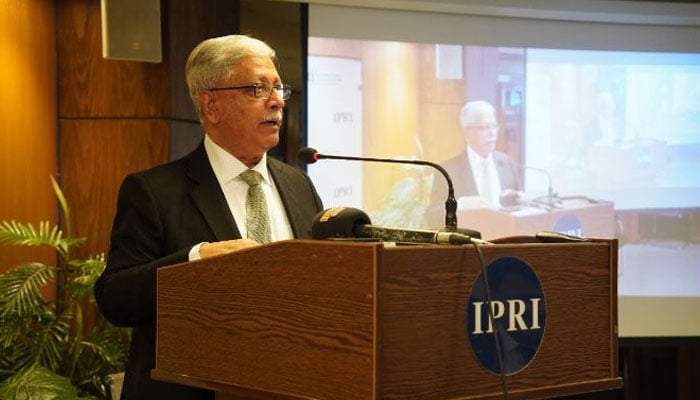Lecture on ‘Evolution of Pakistan’s full spectrum deterrence policy’
Islamabad: The Islamabad Policy Research Institute (IPRI) marked ‘Youm-e-Takbeer’ with an insightful lecture by Lt. General (r) Khalid Kidwai, adviser to the National Command Authority (NCA) and former director general of the Strategic Plans Division (SPD), says a press release.
The lecture focused on the evolution of Pakistan’s Full Spectrum Deterrence Policy. Lt. General Kidwai paid tribute to the past civil and military decision-makers and the silent workers who contributed to the development and operationalisation of Pakistan’s nuclear capability. He highlighted that Pakistan’s nuclear programme was driven by its defence needs, especially after the trauma of the 1971 war and India’s nuclear explosion in 1974. The nuclear capability was acquired to offset the conventional forces’ asymmetry with India.
He elaborated on the development of Pakistan’s nuclear command and control architecture, featuring institutions like the NCA and SPD, which brought greater synergy in planning and development. The triad of strategic forces, comprising the Army, Air Force, and Navy’s Strategic Force Commands, along with compliance with international safety protocols, gave Pakistan a clear competitive edge over India. Lt. General Kidwai discussed the transition from ‘Credible Minimum Deterrence’ to ‘Full Spectrum Deterrence’ and its strategic effects, which have caused a dilemma for Indian strategic planners. He emphasised that Pakistan’s tactical nuclear capability, acquired in 2011, has effectively countered India’s conventional warfighting concepts.
The lecture also addressed the 2019 Balakot incident, highlighting Pakistan Air Force’s effective response, which stymied Indian escalation. Lt. General Kidwai noted that Pakistan’s Full Spectrum Deterrence remains robust, and any amateurish sabre-rattling by Indian political and military leadership would result in further embarrassment for them. He criticised the inflammatory statements by Indian officials regarding Azad Jammu and Kashmir, stressing that Pakistan, secure under Full Spectrum Deterrence, does not adhere to a ‘No First Use’ policy, making no place in India safe in case of any misadventure.
Lt. General Kidwai concluded by stating that Pakistan’s nuclear deterrence has significantly altered Indian warfighting concepts, inducing a regression in their politico-military options. The commemoration of May 28th serves as a reminder of Pakistan’s nuclear capability and the resilience of its people who have overcome nuclear blackmail through perseverance.
-
 Hailee Steinfeld Spills Her 'no-phone' Rule With Husband Josh Allen
Hailee Steinfeld Spills Her 'no-phone' Rule With Husband Josh Allen -
 Bowen Yang Gets Honest About Post SNL Life: 'It’s An Adjustment'
Bowen Yang Gets Honest About Post SNL Life: 'It’s An Adjustment' -
 Charlize Theron Delivers Strong Message At 2026 Winter Olympics Opening Ceremony
Charlize Theron Delivers Strong Message At 2026 Winter Olympics Opening Ceremony -
 Lil Jon Reacts To Son Nathan Smith's Death: 'Devastated'
Lil Jon Reacts To Son Nathan Smith's Death: 'Devastated' -
 Bianca Censori Reveals Where She And Kanye West Stand On Having Children Together
Bianca Censori Reveals Where She And Kanye West Stand On Having Children Together -
 Taylor Swift Hypes Olympic Athletes In Surprise Video Message
Taylor Swift Hypes Olympic Athletes In Surprise Video Message -
 Timothy Busfield Charged With Four Counts Of Child Sexual Abuse
Timothy Busfield Charged With Four Counts Of Child Sexual Abuse -
 Amy Schumer Explains Why Her Sudden Photo Surge Is ‘not A Cry For Help’
Amy Schumer Explains Why Her Sudden Photo Surge Is ‘not A Cry For Help’ -
 Kanye West First Contacted Bianca Censori While In Marriage To Kim Kardashian?
Kanye West First Contacted Bianca Censori While In Marriage To Kim Kardashian? -
 Travis Kelce Reveals What His Nieces Really Do When He, Taylor Swift Visit
Travis Kelce Reveals What His Nieces Really Do When He, Taylor Swift Visit -
 Lola Young Makes Career Announcement After Stepping Back From Touring
Lola Young Makes Career Announcement After Stepping Back From Touring -
 Priyanka Chopra Shares Heartfelt Message For Nick Jonas
Priyanka Chopra Shares Heartfelt Message For Nick Jonas -
 Spotify, Major Labels File $13b Lawsuit Over Alleged Music Scraping
Spotify, Major Labels File $13b Lawsuit Over Alleged Music Scraping -
 Travis Kelce Opens Up About Being Backup Plan For His Nieces
Travis Kelce Opens Up About Being Backup Plan For His Nieces -
 Winter Olympics 2026: Chinese Robot Dance Goes Viral In Milan
Winter Olympics 2026: Chinese Robot Dance Goes Viral In Milan -
 Jessica Biel Urged To Divorce Justin Timberlake?
Jessica Biel Urged To Divorce Justin Timberlake?




